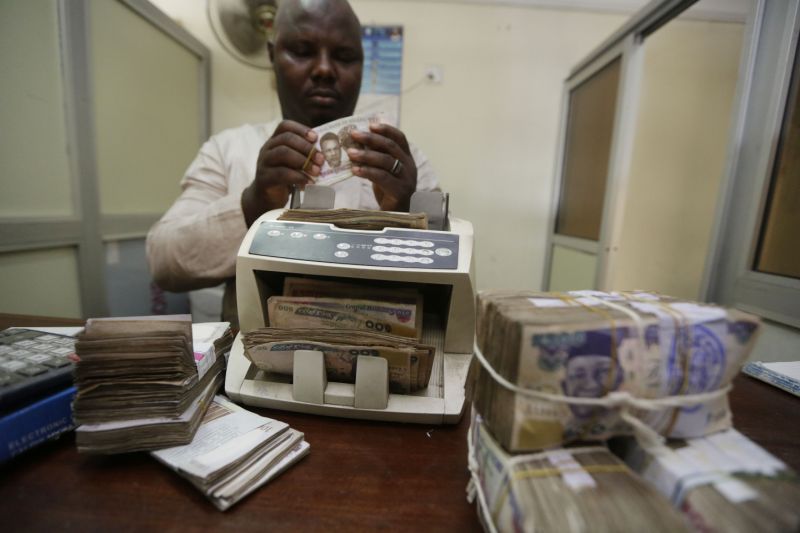- Speculators, Currency Traffickers Lose Heavily as Dollar Continues Freefall
Speculators and naira traffick- ers have gotten their fingers severely burnt as the naira sustained its upswing against the U.S. dollar on the parallel market yesterday.
It closed at N450/$, stronger than the N480 to the dollar from the previous day on renewed confidence in the forex market, gaining N75 in just three days as a result of the new policy actions introduced by the Central Bank of Nigeria (CBN).
The sell rate of the dollar also improved yesterday to close N430/$, as against the N460/$ at which it closed on Thursday as speculators are wary of buying dollars at higher rate, as many have already lost millions of naira.
Yesterday, the Central bank pumped more dollars into the market with each BDC getting $8,000. The apex bank has pledged to sustain the supply.
Investigation revealed that many of the parallel market operators are trying to slow down the fall of the dollar to mitigate the heavy losses they are currently suffering.
Some of them revealed that they had bought huge volumes at over N500/$ in the hope that the naira will continue to fall, only for CBN to dramatically intervene, leading to the naira gaining substantially against the dollar.
A CBN official who pleaded anonymity promised that the bank is ready to supply the BDC more dollars than they will know what to do with.
“We will create supply glut in the market, school fees, PTA, medical expenses will all be covered, there is enough dollars to go round. CBN is ready to flood the market, we will meet everyone’s dollar need.”
Further investigation have revealed that many people, smarting from the strengthen- ing naira now fake letter/ travel tickets to Dubai and Turkey with which they apply for PTA in order to benefit from the 20% above the interbank rate for travellers and payment of school fees. This is relatively easy because visas to these countries are stamped on arrival and so don’t need to present it as a pre-condition to purchase the PTA.
The CBN had in a state- ment titled: “New Policy Ac- tions in the Foreign Exchange Market,” on Monday, among other things, resolved to ease the burden of travellers and ensure that transactions are settled at much more competitive exchange rates and had directed all banks to open FX retail outlets at major airports as soon as logistics permit.
Furthermore, as part of efforts to further increase the availability of FX to all end- users, the CBN said it decided to significantly reduce the tenor of its forward sales from the current maximum cycle of 180 days, to no more than 60 days from the date of transaction.
Speaking on the new FX actions, the Chief Executive Officer, BIC Consultancy Services, Dr. Boniface Chizea, pointed out that the reduction of the wide gap between the official interbank window and the parallel market rate was the major reason for the recent changes to the approach to the determination of the exchange rates.
“And if the recent steps did not breach the gap between the official and parallel market we must then consider this experiment a grand failure. But really it is logical that if you remove a large junk of demand from the parallel market as the recent measures are bound to guarantee that the rates would inevitably appreciate.
“One thing you could say about the parallel market rates is that the rates are very responsive to the movement in demand and supply situ- ations. One thing which the monetary authorities must guard against to ensure success is diversion and no round tripping must be countenanced in this respect. Otherwise the full benefits of the recent measures would not be realised,” Chizea added.
On his part, the CEO, Global Analytics Consulting Limited, Mr. Tope Fasua, faulted criticism of what some had described as the frequent changes to the country’s FX rules, saying that “the role of a central bank is to tinker with policies.”
He commended the central bank for what he termed as its dynamism, saying: “Nobody has a singular policy and then goes to sleep. This economy is not a developed economy. Even the developed economies, they tinker with monetary policies. But I think Nigerians should put themselves in the shoes of these policy makers. I am not saying that they get it all the time. A good central bank must be dynamic and that is what we have been seeing.
“You can’t leave FX sup- ply in the hands of BDCs. What they have just done by allowing the banks to open retail outlets in airports is the best because they (CBN) would be dealing with banks that they can control. No matter what some people feel about the central bank, I personally think they are on the right track. If we look at the accretion to the external reserves, you will see that some of their policies are actually having effects. When people need little amount of FX for school fees and PTA, they should be able to get it without hassle and that is what the CBN has done.”


 Forex3 weeks ago
Forex3 weeks ago


 Naira2 weeks ago
Naira2 weeks ago
 Billionaire Watch2 weeks ago
Billionaire Watch2 weeks ago




 Naira3 weeks ago
Naira3 weeks ago




 Naira2 weeks ago
Naira2 weeks ago




 Naira1 week ago
Naira1 week ago




 Naira4 weeks ago
Naira4 weeks ago




 Naira4 weeks ago
Naira4 weeks ago





















